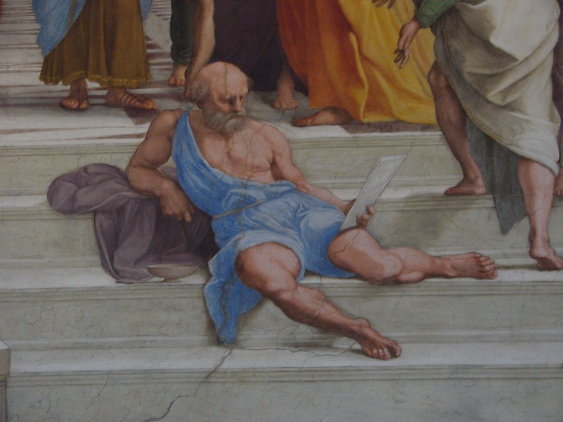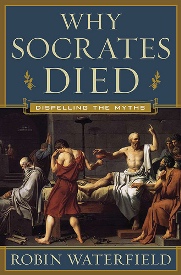
Why Socrates Died: Dispelling the Myths
by Robin Waterfield
-Reviewed by Jodie Liu
Man and myth, hero and villain, scrupulous citizen and impious social deviant – after his death, whenever a quality was attributed to Socrates, he was also called its opposite. So much was written about the man that only decades after he drank a cup of hemlock, Socrates became a subject of great controversy and intrigue. In a revisionist history that decodes the strange circumstances of Socrates’ trial for a modern audience, Robin Waterfield proposes a new understanding of Socrates. In her take, Socrates is neither atheistic cult leader nor infallible martyr, but simply human, deeply entrenched in absolute views of morality but also deeply naïve.
The most fleshed out figure in Waterfield’s narrative is, interestingly, not Socrates but his former pupil Alcibiades. What was Alcibiades’ claim to infamy was Socrates’ downfall. Socrates may have been born into a society that endorsed exclusive drinking clubs and man-boy homoeroticism, but Alcibiades who associated Socartes with such activities in the public mind. Marked by stunning hubris, Alcibiades made bold (and later desperate) advances towards Socrates, ensuring both men made the rounds in Athenian gossip circles. Alcibiades’ arrogance followed him into battle, most famously in the Peloponnesian War. If Alcibiades overlooked conventions in Athenian society, then he certainly flouted them during wartime, where he craved military acclaim but did little to warrant it. Though he undoubtedly had a gift as a military strategist, Waterfield admits, Alcibiades was often “busy extending his honour by more dubious means” in the form of sexual conquests and petty skirmishes over wounded pride. “Like Oscar Wilde,” Waterfield writes, “he was putting his genius into his life and only talent into his work.”
The wounds of that war, and of civil conflict, transformed Athens from the oligarchic tradition to favoring democracy, just as Socrates’ trial began. As Waterfield puts it, “A useful parallel would be the tumult experienced by much of the ‘first world’ in the 1960s.” In this volatile setting, the fledgling Athenian democracy became thoroughly disgusted by Alcibiades’ devil-may-care attitude. Socrates’ association with such behavior was quite literally poisonous, and to make matters worse, it became known that Socrates worshipped non-Athenian gods. Eventually, Waterfield explains, the new Athens came to identify Alcibiades as the exemplar of “moral uncertainty which had led them to episodes of ruthless brutality” and Socrates as the force who had enabled Alcibiades.
But the blame cannot be laid entirely upon Alcibiades, Waterfield concedes. For all of Socrates’ greatness, he may have been in some ways too great and in others not great enough. Plato claimed Socrates was “morally superior to the jury,” a man who died because the jury that condemned him was “beneath his dignity.” Yet, his own naïveté shone through in his habit of associating with whomever he pleased, including numerous anti-democrats and traitors besides Alcibiades, in the belief that his true loyalties would ultimately trump false allegations. Socrates had unwillingly become a figurehead for all that had gone morally awry in Athens, but it was his own unwavering morality – the conviction that truth would prevail – which made him such.
Excerpt: “If political thought starts with the consideration of three factors – how power should be exercised in the community, how power should be limited and controlled in the community, and what the goals are of wielding power in the community – then, as far as our evidence goes, Socrates contributed to the first and the third of these questions, but failed to address the middle one. That is, he was sure that power should be given to the wise, and he was sure that the point of political power was the moral improvement of every citizen, but it is not clear how he thought the wise were to achieve this, or what steps he thought should be taken to educate and control the power-possessors and ensure that the goal of moral improvement was not diverted into other channels, or where he stood on the pros and cons of collectivism versus pluralism.”
Further Reading: The Trial and Death of Socrates: Four Dialogues and Socrates: A Life Examined
*Photo courtesy Allie Caulfield.





Send A Letter To the Editors